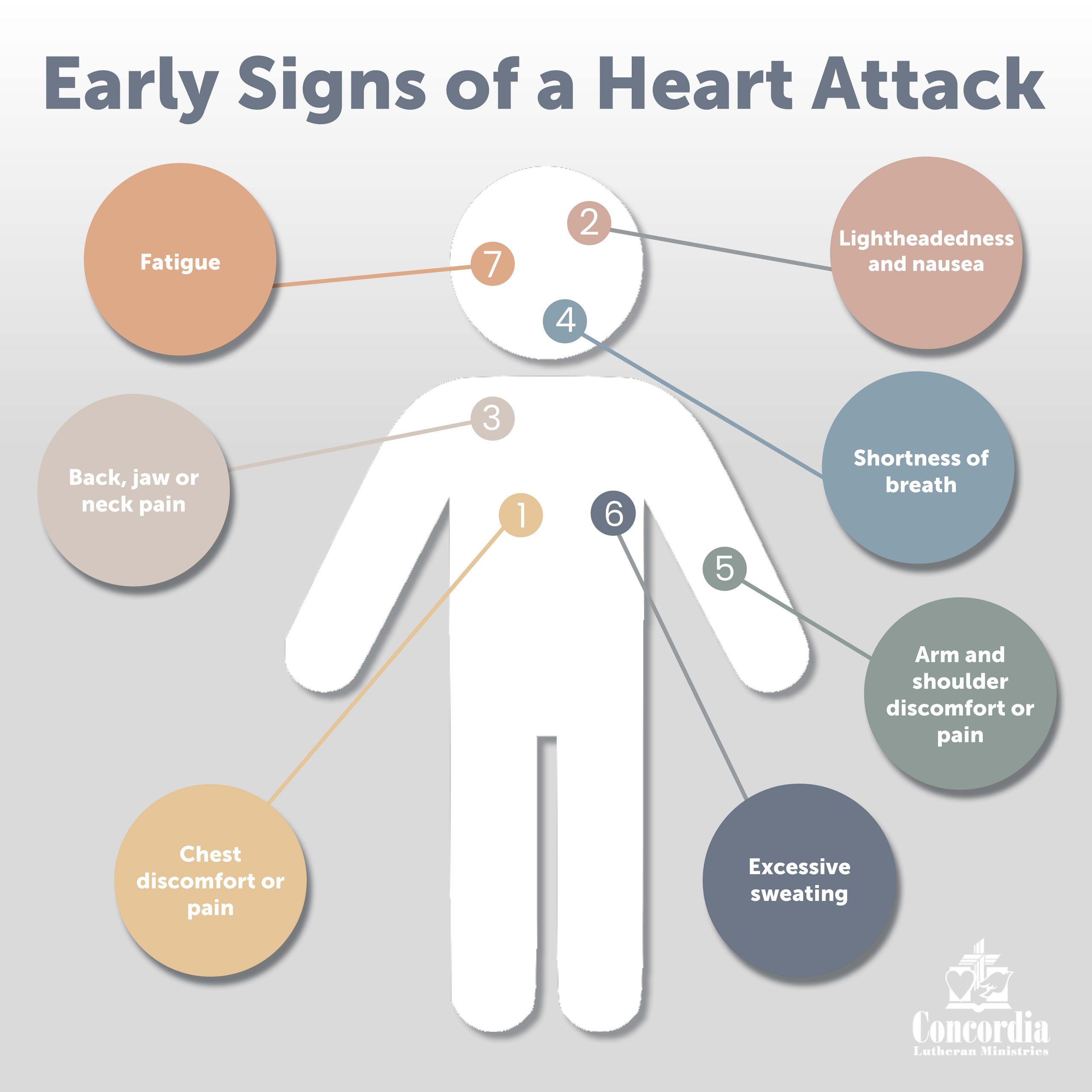7 Early Signs of a Heart Attack

February is American Heart Month, a time when our nation comes together to raise awareness about heart disease – the leading cause of death in the United States. According to the American Heart Association, annual heart attack incidences affect 805,000 Americans and on average, 605,000 experience their first attack each year and 200,000 suffer a recurrent attack.
Heart healthy living is important to keep our hearts beating the best that they can. Staying active, reducing stress, breaking bad habits such as smoking, limiting alcohol intake and adopting a heart healthy diet rich in heart healthy foods all aide in decreasing the chance of a heart attack. Maintaining regular checkups with your physician, especially for our senior friends, and following doctor’s orders will help to ensure optimal heart health.
Related: 4 Tips to a Healthy Heart
While positive lifestyle changes can lower your risk of heart disease, genetics can affect the likelihood of heart disease and your chances of suffering a heart attack. Paying close attention to what your body is telling you is an effective way to monitor your health and recognizing the seven early signs of a heart attack can help save a life. Even if you are unsure if it is a heart attack, don’t hesitate to call 911 if you experience the following:
7 Early Signs of a Heart Attack
1. Chest discomfort or pain
Discomfort or pain in the center or left side of the chest that lasts a few minutes or more is the most common sign of an impending heart attack. This discomfort can have various qualities of pressure, fullness, tightness or squeezing with pain ranging from a dull ache to a sharp burning sensation.
2. Lightheadedness or nausea
Watch out for lightheadedness or sudden dizziness that sometimes precedes nausea and vomiting. These symptoms can occur without or in addition to classic chest pain. Women are more likely than men to experience dizziness, nausea or anxiety.
3. Back, jaw or neck pain
Pain that is often difficult to pinpoint that originates in the jaw and can spread to the neck and radiate down the back is often a key warning sign. This pain may come and go, occur on either side of the body and is often described as pulsating.
4. Shortness of breath
Shortness of breath occurs when your heart is not pumping blood to its full ability. This can first be felt in the chest and can cause difficulty to catch ones’ breath, the feeling or need to breathe more quickly and feeling unable to take a complete, deep breath.
5. Arm and shoulder discomfort or pain
Men are likely to have pain that spreads to the left shoulder and down the left arm or up to the chin. Women experience a more subtle pain that can travel to either the left or right arm, up to the chin and spread across the shoulder blades and lower back.
6. Excessive sweating
Sweating more than usual, especially for those who lead a sedentary lifestyle, is often a clear indicator of heart problems. The heart slows during a heart attack and the ability to pump blood through the body is challenged causing the body to sweat more in effort to stay cool during the extra exertion.
7. Fatigue
One of the most common symptoms recorded by women who have suffered a heart attack is unexplained or unusual fatigue. In a study first published in 2003 by the American Heart Association peer-reviewed journal Circulation, a survey of 515 women who had heart attacks found that 95% first experienced such symptoms a month before their attack. Unexplained fatigue and exhaustion are also early indicators for male heart attack victims.
There are many resources to help you monitor and improve your heart health. At Concordia, we understand that the chance of developing heart-related conditions grows greater with age. We are committed to providing our residents and patients with high quality preventative care and offer specialty disease management programs for those who have been diagnosed with a chronic illness through our home health care services.
Related: Telehealth Services: An Effective Intervention in Reducing Rehospitalizations
Several locations including: Concordia at Cabot, Concordia at Rebecca Residence, and Concordia Village of Tampa, as well as our other retirement living locations, have many different resources, including educational material to help individuals understand their heart health.
Additionally, for those who have received a physician’s referral for home health care, Concordia Visiting Nurses provides cardiac-focused home care services, including a robust telehealth program, that aim to eliminate unnecessary trips to the physician’s office and reduce hospitalizations that accompany a heart disease diagnosis.
On a recent episode of Let’s Talk, a radio program airing on WISR 680 AM in Butler, Pennsylvania, Laura McGraw, RN, Transitional Nurse Liaison for Concordia Visiting Nurses and Frank Skrip, Director of Public Relations for Concordia Lutheran Ministries, discuss the various services Concordia offers in regards to heart health and provide excellent education on preventative care.
If you are experiencing any of the heart attack symptoms outlined in this article, call 911 immediately. Consult with your doctor on ways you can improve your heart health. Keep your risk to a minimum with help from the caregivers at Concordia. Each one of our senior care communities and home and community-based service lines goes above and beyond the standard for healthcare, providing our residents and patients with highly qualified professionals who are dedicated to providing quality care. You can also message us through our online contact form.
Get Updates From Concordia
There is always a LOT happening at Concordia! Would you like to stay up-to-date with our news and events? Sign up for our monthly e-newsletter here.